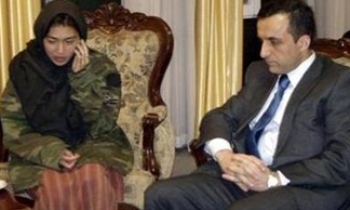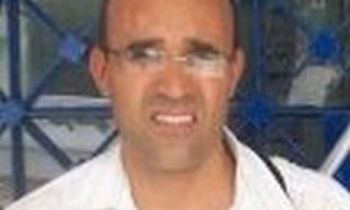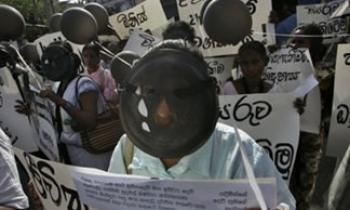International Freedom of Expression Exchange (IFEX) members have urged the international community and media to respond to the attacks on journalists in Lebanon.

Reporters sans Frontières (RSF) addressed a press conference Monday at the headquarters of the An-Nahar daily newspaper in Beirut to reiterate its condemnation of the murders of journalists Samir Kassir and Gebran Tuéni in bombings on June 2 and December 12, and the maiming of fellow journalist May Chidiac in a bombing on 25 September.
RSF secretary-general, Robert Ménard, Tuéni's daughters, Nayla et Michèle Tuéni, Kassir's widow, Gisèle Khoury, and Khoury's daughters, Mayssa and Liana, all spoke at the press conference, recounting their personal memories of the victims and issuing an appeal to the international community.
Nayla Tuéni, herself a young journalist, urged the Lebanese judicial authorities to speed up their investigations. She also called on the country's press to launch a major campaign to try to end the wave of killings that has shaken Lebanon since October 2004. She said everyone knew her father was under threat and therefore the entire country was responsible for his death.
Khoury said, "Lebanon is the only Arab country that enjoys a degree of freedom and this is the reason why journalists are being killed. We call on all our colleagues throughout the world to react, so that the deaths of Gebran and Samir can strengthen our determination."
Kassir's daughter, Liana, appealed to Jean-Louis Bruguière, the French anti-terrorist judge in charge of the French investigation into the death of her father, who had French and Lebanese dual citizenship. "Judge Bruguière, we are waiting for you," she said, looking firmly at the TV cameras.

Tueni was well known for his outspoken criticism of Syrian influence in Lebanon and was one of the first Lebanese editors to publicly condemn the pro-Syrian regime through his columns and public statements. A father of four, he was killed the day after he returned home from Paris, where he had lived since August because of fears for his safety.
A previously-unknown group calling itself Strugglers for the Unity and Freedom of the Levant claimed responsibility for the attack but there was no independent confirmation. Tueni's assassination was condemned by IPI, the World Association of Newspapers (WAN), Reporters sans Frontières (RSF), the Committee to Protect Journalists (CPJ) and the International Federation of Journalists (IFJ).
Ménard voiced "disappointment" at UN security council resolution 1644 extending the mandate of the international commission that is investigating former Lebanese Prime Minister Rafik Hariri's assassination, as it authorises the commission just to provide technical assistance to the Lebanese government and leaves the government in charge of the investigations into all the political killings and bombings in Lebanon since October 2004.
"If the United Nations do not do anything more, this wave of violence will inevitably continue," Ménard said. "We are going to appeal to all the international bodies such as the Human Rights Commission, the Council of Europe and the European Parliament." "The Lebanese media must also mobilise more to combat this violence, of which they are the first victims," he added.

The Committee to Protect Journalists (CPJ) urged United Nations Secretary-General Kofi Annan to work to broaden a UN investigation into the murder of former prime minister Rafiq al-Hariri to include bomb attacks on three Lebanese journalists. The UN Security Council authorised Annan on Thursday last to make recommendations for expanding the Hariri investigation to other attacks on Lebanese civilians.
It unanimously passed a resolution extending by six months the mandate of the International Independent Investigation Commission into the February 14, 2005 bombing death of Hariri. The resolution also authorised the commission to "extend its technical assistance" to Lebanese authorities for their investigations into attacks on journalists and other political figures over the past year. It called on Annan to "present recommendations to expand the mandate of the commission to include investigations of those other attacks."
The resolution renewed the mandate of the current investigation and also followed a request this week by Lebanese Prime Minister Fouad Siniora for either an expansion of the commission's mandate or the establishment of a new investigation that would include other attacks. Siniora's call came after a car bomb on December 12 killed Al-Nahar publisher and columnist, and member of parliament, Gebran Tueni, in Beirut.
Although the resolution falls short of outright approval for an extended investigation into other attacks, CPJ called it "a step in the right direction." The resolution marked the first time that the Security Council had linked the Hariri probe with other murders and attempted assassinations in Lebanon, including those of at least three prominent journalists.

"We are hopeful that this resolution will pave the way for expanding the UN inquiry to address other appalling attacks on civilians in recent months, including those against journalists," said CPJ Executive Director Ann Cooper. "We trust that Secretary-General Annan will work quickly with the commission to help ensure that these attacks receive the international scrutiny that they deserve. Doing so will send a powerful message that the international community will not tolerate such brazen attacks that jeopardise press freedom and freedom of expression."
Following Tueni's murder CPJ renewed its call for the Security Council to expand the UN investigation of Hariri's murder to include the unsolved deaths and attacks on journalists. Since Hariri's assassination and the launch of the UN inquiry, Samir Qassir, a prominent columnist in the daily Al-Nahar was killed in a car bombing, and a Lebanese Broadcasting Corporation talk show host May Chidiac was maimed in another. The Lebanese opposition has blamed the attacks on Syria, which has denied them.
This has been a black year for the Lebanese press. The first journalist to die, Kassir, was a correspondent for the French television station TV5 and an columnist for An-Nahar. Then LBC television presenter May Chidiac was maimed by a bomb in September. All this took place during the extended crisis resulting from Hariri's assassination on February 14. Finally, the death on December 12 of Tuéni, the CEO of An-Nahar and a member of the Lebanese parliament, has confirmed the worst fears of Lebanon's journalists.









